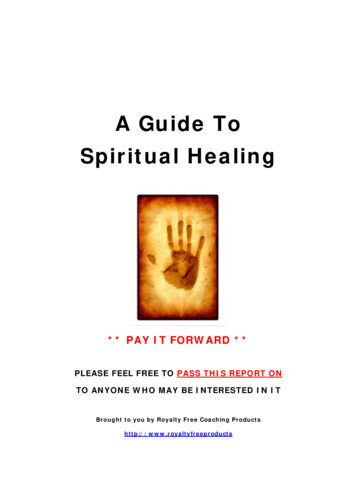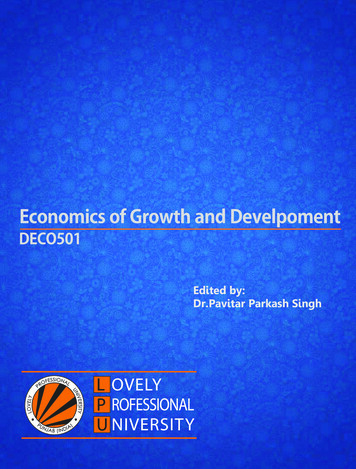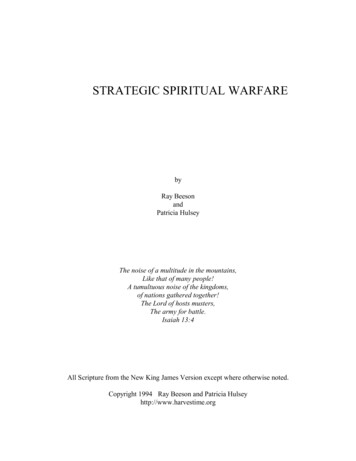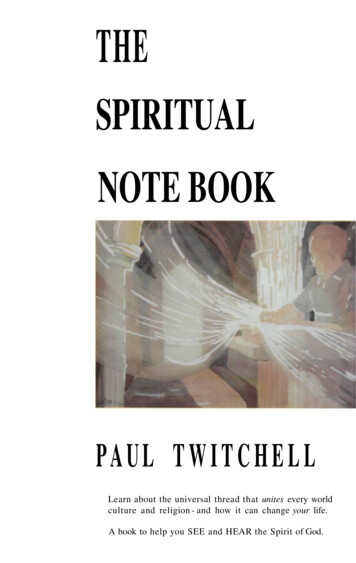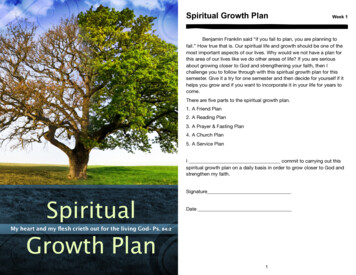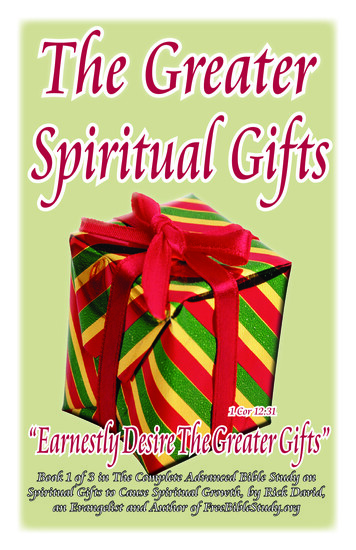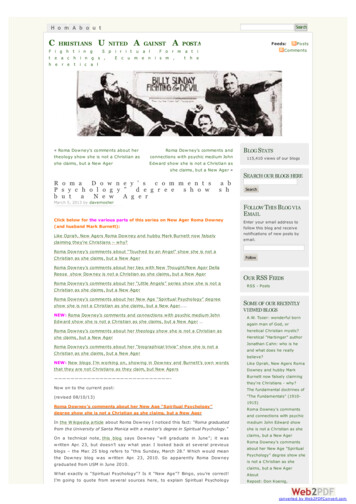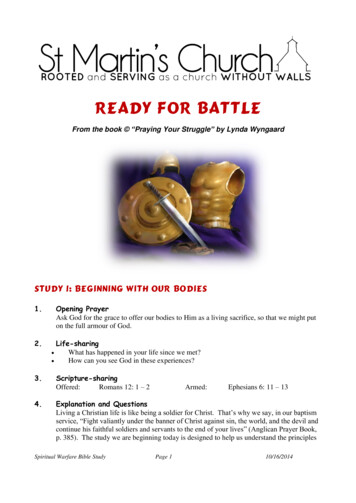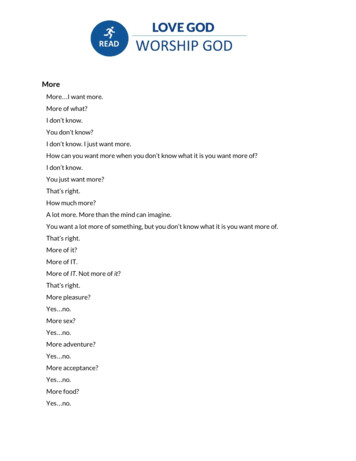
Transcription
MoreMore I want more.More of what?I don’t know.You don’t know?I don’t know. I just want more.How can you want more when you don’t know what it is you want more of?I don’t know.You just want more?That’s right.How much more?A lot more. More than the mind can imagine.You want a lot more of something, but you don’t know what it is you want more of.That’s right.More of it?More of IT.More of IT . Not more of it ?That’s right.More pleasure?Yes no.More sex?Yes no.More adventure?Yes no.More acceptance?Yes no.More food?Yes no.
More drink?Yes no.More admiration?Yes no.So you want more money, sex, adventure, acceptance, food, drink, admiration? You want moreof all that?I want more than all that.More than all that?Yes.You’re hard to please.Silence.I’m impossible to please.Impossible to please?Yes, feels that way.Heart HungerWe are a hungry people. We move through life in search of something. We rifle through thingafter thing. We like these things, but they’re never quite enough.What is it we’re after?What are we searching for?Why do we enjoy things only to grow bored with them and discard them?What can we do with this insatiable hunger for more?Solomon’s QuestIf there ever was a person who understood the insatiable hunger for more that person wasSolomon. The place he recorded his thoughts and discoveries about this hunger is a portion ofScripture we call Ecclesiastes .Ecclesiastes opens with an identified purpose:I, the Teacher, was king over Israel in Jerusalem. I devoted myself to study and to explore bywisdom all that is done under heaven.(Ecclesiastes 1:12-13)The pages that follow this stated purpose chronicle Solomon’s quest to “study and explore bywisdom all that is done under heaven.” Or put more plainly, Ecclesiastes is a journal. It’s thejournal of a person who lived long ago who went on a quest to understand life. This journal hasstood the test of time, because of it’s powerful and profound insights, and maybe mostpointedly, because of Solomon’s honest and raw pursuit to satisfy his own insatiable hungerfor more.Worship God READ Page 2
Solomon’s quest took him to numerous stops.He tried pleasure I thought in my heart, “Come now, I will test you with pleasure to find out what is good.” Butthat also proved to be meaningless. “Laughter,” I said, “is foolish. And what does pleasureaccomplish?” I tried cheering myself with wine, and embracing folly—my mind still guiding mewith wisdom. I wanted to see what was worthwhile for men to do under heaven during the fewdays of their lives.(Ecclesiastes 2:1-3)Pleasure left him wanting.The insatiable hunger for more proved to be greater than pleasure and folly could deliver. Didhe have fun? Yes, he had fun, but did it satisfy the longings of his heart? The answer is provednot just by his words but by his actions. He left this way of living in search of something more.He tried achievement I undertook great projects: I built houses for myself and planted vineyards. I made gardens andparks and planted all kinds of fruit trees in them. I made reservoirs to water groves offlourishing trees I amassed silver and gold for myself, and the treasure of kings andprovinces Yet when I surveyed all that my hands had done and what I had toiled to achieve,everything was meaningless, a chasing after the wind; nothing was gained under the sun.(Ecclesiastes 2:4-6, 8, 11)Achievement left him wanting.As with pleasure, the insatiable hunger for more proved to be greater than the greatestachievements he could attain. Did he achieve much? It is said he was greater than anyone whohad ever lived in Jerusalem (Ecclesiastes 2:9). Was this greatness great enough to satisfy theinsatiable hunger for more? Here again, the answer is proved not just by his words but by hisactions. He moved on to other things.He tried education Then I turned my thoughts to consider wisdom, and also madness and folly. What more can theking’s successor do than what has already been done? I saw that wisdom is better than folly,just as light is better than darkness. The wise man has eyes in his head, while the fool walks inthe darkness; but I came to realize that the same fate overtakes them both. Then I thought inmy heart, “The fate of the fool will overtake me also. What then do I gain by being wise?” I saidin my heart, “This too is meaningless.” For the wise man, like the fool, will not be longremembered; in days to come both will be forgotten. Like the fool, the wise man too must die!(Ecclesiastes 2:12-16)Pleasure didn’t do it.Accomplishment didn’t do it.Education didn’t do it. Wisdom left him wanting.The result? “ So I hated life ” (Ecclesiastes 2:17).That’s strong. He hated life.Worship God READ Page 3
Why? because the work that is done under the sun was grievous to me. All of it is meaningless, achasing after the wind. I hated all the things I had toiled for under the sun.(Ecclesiastes 2:17-18)Extreme? Maybe.Honest? Very.Solomon’s ObservationSo what did Solomon do with this? He’s passing through life, he’s trying this and trying that, buteverything leaves him wanting. What did he learn from this?Midway through Ecclesiastes, Solomon makes an observation easily missed but profoundlyimportant: “God has set eternity in the human heart.” (Ecclesiastes 3:11).Our hearts are designed with a hunger not just for something big, but for something infinite,something eternal.God has set eternity in the human heart.That’s our condition.That’s our longing.There’s something in our design that longs for The Infinite, The Grand, The Eternal.We look for IT in work.What do we discover?Not IT. Just it.We look for IT in life’s pleasures.What do we discover?Not IT. Just it.We look for IT in accomplishment.What do we discover?Not IT. Just it.But God has set eternity in the human heart.We don’t just want it. We want IT.Everybody WorshipsConsider a thought: Everybody worships.We doubt this. We don’t think everybody worships, because not everybody goes to church,not everybody likes to sing, and maybe most importantly, not everybody believes in theexistence of God. Some people worship, but not everybody.But this misses something.Worship God READ Page 4
What if worship isn’t the singing of songs? What if worship isn’t a weekly service? What ifworship could be these things, but is much more than these things, and what if these things areoften done in a manner that is anything but worship?What if worship has much more to do with our insatiable hunger for more than it does withwhat we do for an hour on Sundays?Consider this carefully.We worship that thing, that person, that opportunity that is at the center of our passion, ourdesire, our heart. Most worship does not feel stereotypically religious. Most worship feelshighly secular. Worship is pervasive; it’s just not always worship of God.Solomon worshipped pleasure, then he worshipped achievement, and then he worshippededucation. The worship of these things left him wanting, but he did benefit in one powerful andimportant way.He recognized that the insatiable hunger for more was not satisfied by pleasure, achievement,and education, because the insatiable hunger for more was searching for something eternal.Everybody worships, but not everybody worships God.One ThingEver read a statement so shocking you’re not sure it’s true? Maybe it’s a statistic. Maybe it’sanother person’s conviction. Maybe it’s a perspective on life.David made a shocking statement. It’s easily missed but must be carefully considered. We’lltake it slowly, in two parts.David writes, “ One thing I ask of the LORD, this is what I seek ” (Psalm 27:4) .One thing. Just one thing.With one hand on this statement and the other on our insatiable hunger for more, how can weunderstand this man’s desire for just one thing? Is it possible to say we really just want onething? Truly, if his pen were in your hand, would you be able to authentically complete thestatement? Might you scratch it out and write, Three things I ask of the Lord ? What could be your one thing? God grants you a wish. What do you wish for?Let’s put the pen back in David’s hand and discover his one thing.One thing I ask of the LORD , this is what I seek: that I may dwell in the house of the LORD all thedays of my life, to gaze upon the beauty of the L ORD and to seek him in his temple. (Psalm 27:4)David wants one thing. He wants God.When we lay this statement alongside Solomon’s quest, we discover something profound.Solomon rifled through life’s many offerings, and these offerings left him wanting. This ledSolomon to the realization that his heart would never be satisfied with the offerings of thisworld, because his heart wasn’t longing for something in this world. His heart was longing forsomething that transcends this world, something eternal.Which puts David’s statement into important context.Worship God READ Page 5
Take note that the reason David gave for his one thing is the desire for beauty. He wants to“gaze upon the beauty of the LORD .” Consider the common pursuit of beholding beauty in creation.We travel long distances, climb tall mountains, walk long trails, and seek secluded meadows.Why? Numerous reasons could be given, but no doubt one of them is this: We long for beauty.The rugged mountain climber and the delicate gardener have this in common: the pursuit ofbeauty. One pursues beauty by gazing upon the vastness of the mountain range from thevantage point of the highest peaks; the other pursues beauty in the delicacy of the petals of atiny flower from the vantage point of a quiet corner garden. It is not a man-thing or awoman-thing; beauty and pleasure touch something deep within all of us. David longed forbeauty. We all, in one way or another, long for beauty as well.Which raises a question.Why want God? Why not write, “ One thing I ask of the Lord, this is what I seek, to gaze upon thebeauty of a vast mountain range ” ? If it’s beauty he’s after, this would make sense. Why not askfor countless sunsets, bountiful gardens, or star-filled nights?Only David can speak for David, but common experience and complementary Scripture give afew clues. The beauty that surrounded David, as profound as it was and still is today, not onlysatisfied a hunger of his heart, but no doubt it also created a hunger in his heart. Theexperience is quite common. What happens when we taste food we love? We want more. Ahunger for that food is simultaneously satisfied and created. What happens when we take inthe beauty of a lakeside mountain? We want more. A hunger for the beauty of creation issimultaneously satisfied and created.In speaking of creation David wrote something profound and intriguing.The heavens declare the glory of God; the skies proclaim the work of his hands. Day after daythey pour forth speech; night after night they display knowledge.(Psalm 19:1-2)David looks upon the stars, the heavens , and he says they declare the glory, or we might sayhere, beauty , of God. When he looks to the heavens, when he considers the vastness of theskies, they do not just proclaim their beauty within themselves, but they point to a Creator, andthey pour forth speech about that Creator. They say something about God.You might say they worship God.They declare not just the beauty of creation, but the implied beauty of the Creator. David seesthe vastness of the skies and the heavens, and he shakes his head in wonder, “God must bemarvelous! God must be wondrous! God must be astounding!” The beauty he beholdssimultaneously satisfies a hunger and creates a hunger, and David instinctively knowssomething.He knows the deep hunger for beauty will not be fully satisfied by seas or sunsets.He knows the deep hunger for beauty, because it’s an eternal hunger, will only be fully satisfiedby an eternal God.Or put another way David loves God with all his heart, soul, and strength because to satisfy his passion for beauty inany lesser thing, to love a lesser thing with all his heart, soul, and strength, will just leave himwanting. God must be ultimate in his love, ultimate in his pursuit of pleasure. All else will onlyWorship God READ Page 6
partially satisfy because that is what all else is designed to do. The creation is designed to pointto the Creator, to worship the Creator, not be the Creator.The beauty that surrounds us is designed to simultaneously satisfy hunger and create hunger.Only God, and God alone, will bring complete fulfillment to an eternal longing. Seek to fullysatisfy that deep hunger for beauty through the many beautiful things that surround us, andwe will be frustrated by the tastes of beauty rather than allowing them to point us to theultimate satisfier of our heart’s desires. David longed for one thing, and that one thing wasGod, because he was convinced God and God alone would finally and fully deliver the completesatisfaction for which his heart longed.Gifts or GodsIf this is the case, if we are to direct our hearts to God in hopes of satisfying our eternal longing,what do we do with the stuff of life? What about good food, deep sunsets, and vast mountainranges?Solomon offers another profound observation that must not be missed. What does he sayconcerning the stuff of life?These are “the gift of God” (Ecclesiastes 3:13).The “gift” of God. Gifts not gods.The human design is one that longs for The Eternal . Solomon is making a distinction. It’s critical.Might it go something like this:Let gifts be gifts and God be God.When we expect a gift to be God, we will ultimately be frustrated or disillusioned with thosegifts as they fail to satisfy the eternal hunger of our hearts. When we let gifts be gifts, we canenjoy these gifts for what they are rather than despise them for what they are not.God gives gifts, but he never intended them to deliver what only he can deliver.He is The Eternal .Work is not The Eternal .Human relationships are not The Eternal .Brownie fudge pie is not The Eternal .Money is not The Eternal .Sex is not The Eternal.Baseball is not The Eternal .Spouses are not The Eternal .Children are not The Eternal.God and God alone is The Eternal .When asked what is most important in all of Scripture, Jesus didn’t blink Worship God READ Page 7
‘Love the Lord your God with all your heart and with all your soul and with all your mind.’ Thisis the first and greatest commandment.(Matthew 22:37-38)Let’s adjust the language a bit to pull this all together.Love The Eternal with all your heart, soul, and mind because God has set eternity in thehuman heart. Our hearts were designed for something infinite, something grand,something eternal. All else will prove frustrating when vainly attempting to be TheEternal.Solomon’s DiscoveryIs this what Solomon discovered? We’ve yet to hear how it all turned out. What was the end ofhis quest? Where did it lead him?Solomon reveals his discovery in his final comments in the final chapter of Ecclesiastes.Now all has been heard; here is the conclusion of the matter: Fear God and keep hiscommandments, for this is the whole duty of humanity. For God will bring every deed intojudgment, including every hidden thing, whether it is good or evil.(Ecclesiastes 12:13-14)Solomon points to a day. It’s the day we will stand before The Eternal. Much may happenbetween now and then, but Solomon is crystal clear on the matter. He will not live for thefleeting pleasures of this world. He has set his sight, and directed his heart, to the day he willstand before The Eternal.WorshipAs we consider our passions, our desires, our worship, consider the second commandment:You shall not make for yourself an idol in the form of anything in heaven above or on the earth(Exodusbeneath or in the waters below. You shall not bow down to them or worship them. 20:4)Translation?Don’t worship lesser things. Lesser things will frustrate your heart. The heart is designed forThe Eternal . Worship God and God alone. Yes, you will do this in song, but let the songs simplybe a way of tuning your heart for what you must do with your life. True life is found in thesatisfaction of our deepest desires, and our deepest of all desires, is a longing for The Eternal.Don’t waste your life expecting gifts to be God.Let gifts be gifts and God be God.Live for God.Worship God.Love God.Scriptures taken from the Holy Bible, New International Version , NIV . Copyright 1973, 1978, 1984, 2011 by Biblica, Inc. Used bypermission of Zondervan. All rights reserved worldwide. w ww.zondervan.com T he “NIV” and “New International Version” aretrademarks registered in the United States Patent and Trademark Office by Biblica, Inc. . Copyright 2013 Gateway CommunityChurchWorship God READ Page 8
important: "God has set eternity in the human heart." (Ecclesiastes 3:11). Our hearts are designed with a hunger not just for something big, but for something infinite, something eternal. God has set eternity in the human heart. That's our condition. That's our longing.
